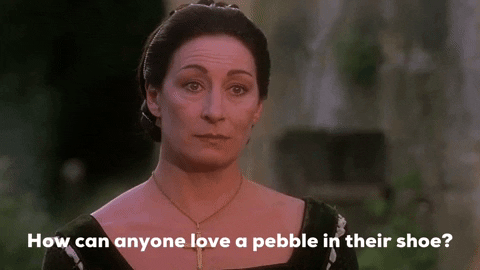Thanks for reading A Year of Mental Health! If you're enjoying it, consider supporting the project by upgrading your subscription. This grants you access to bonus tools and resources, as well as the joy of making the newsletter free to others. 💚 1. You know how sometimes you end up with a pebble in your shoe, and it gets really annoying?At first, you hardly notice it—but then it becomes all you can think of. Every step hurts, even if you try to ignore it. The pebble in your shoe is a small problem that grows bigger over time, yet also comes with an easy and obvious solution. Maybe it’s true that you could learn to live with the pebble. You might think, well, lots of other parts of my life are pebble-free, so I should be grateful. But of course, the much better option is to do something really simple and easy about the pebble. Finally, you decide to stop resisting. You take off your shoe and remove the pebble. You feel instantly better. You are much better off than you were before. 2. Most of the time, major life events don’t change our baseline of happiness.There's a concept in the social sciences called hedonic adaptation. It basically states that most people have a relative baseline level of happiness that they tend to revert to. The interesting thing is that major life events tend to not change this baseline, at least not permanently. A new relationship or major promotion gives it a boost for a while, and a major trauma or significant loss lowers it for a while, but over time we tend to return to a baseline. One of the most telling examples of hedonic adaptation comes from a classic study of lottery winners.¹ It turns out that if you look at people who've won hundreds of millions of dollars, just a few months after winning they have roughly the same happiness level as they did before cashing in. Hedonic adaptation is a powerful force! Why is this relevant? First, it shows you that outside circumstances are not nearly as important to your wellbeing as you think. We tend to attribute more importance to those things—which, after all, are outside our control—and less importance to self-development and understanding how we can make better decisions (which is at least somewhat within our control). And yet … there’s always been something a little unsatisfying to me about the hedonic adaptation concept. I’m not one to question the validity of sound science, but sometimes I wonder: might there be more to the story? For example: 3. What if there are some pretty big exceptions, like when you take a pebble out of your shoe?I recently read a post from Sasha Chapin, who writes about emotions and creativity. The post is difficult to excerpt but I’ll try (click through to read the full post, I’m just shortening a few things for clarity):
(Again, I added some emphasis there. The point is that Sasha made some big changes and thus has upgraded himself on his personal range of hedonic adaptation.) My anecdotes are different from his, but I can also see some similarities: we each made some big changes in our lives, and then we each felt a lot better. It makes sense on an intuitive level, right? If you make significant, positive changes in your life, you should be able to expect significant, positive results. Just like if you fall in a well tomorrow or lose your sight or otherwise experience a significantly adverse event, your life is going to feel worse. *** So this brings us back to the pebble in the shoe, and perhaps another way to think about hedonic adaptation: the science behind it is sound, but if we really want to, we can make greater leaps outside our predicted range. We are not confined to the same range all the time—or at least, we are not powerless in the process. Also, if you have a pebble in your shoe, maybe you should try taking it out and see what happens. 1 Lottery winners and accident victims: is happiness relative?https://pubmed.ncbi.nlm.nih.gov/690806 You're currently a free subscriber to 🌻 A Year of Mental Health. For the full experience, upgrade your subscription. |
Monday, April 15, 2024
Can You Be Much Happier than You Thought?
Subscribe to:
Post Comments (Atom)
Welcome to Bernie Schaeffer's Award-Winning Option Advisor
Congratulations! By signing up for Option Advisor, you just took the first step towards becoming a successful trader and pot...
-
insidecroydon posted: " Become a Patron! What's on inside Croydon: Click here for the latest events listing...




No comments:
Post a Comment